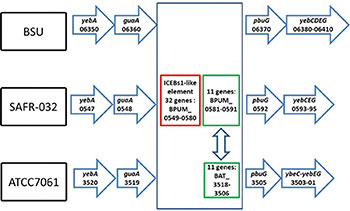Articles in PLOS One and Extremophiles

Overview of the consecutive multiple gene insertions in the radiation resistant spore-producing bacterium B. pumilus SAFR-032 isolated from NASA's Spacecraft Assembly Facility.The lab team of George Fox, professor of biology and biochemistry at University of Houston, recently published two articles shedding light on how spores from the bacterium Bacillus pumilus survive after being deprived of water and exposed to extreme radiation.
The bacteria were isolated from the spacecraft assembly facility at NASA's Jet Propulsion Laboratory. A better understanding of the bacteria’s resistance will lead to improved ways to keep these sturdy organisms from hitching a ride on spacecraft leaving Earth.
In PLOS One
The article, “Candidate Genes that may be Responsible for the Unusual Resistance Exhibited by Bacillus pumilus SAFR-032 Spores,” published online June 14 in PLOS ONE. The open-access publication features reports of original research from all disciplines within science and medicine.
The paper was co-authored by participants from four institutions. The UH team included Fox, first author and postdoctoral research fellow Madhan Tirumalai, former computer science graduate student Rajat Rastogi, former undergraduate student Nader Zamani, and former undergraduate student Elisha O’Bryant Williams interning under the UH Alliance for Graduate Education and the Professoriate. Texas Southern University undergraduates Shamail Allen, Fatma Diouf and Sharon Kwende were also co-authors. Other senior investigators involved in the project were George M. Weinstock, professor of genetics and molecular microbiology at the Washington University School of Medicine, and Kasthuri J. Venkateswaran, senior research scientist at the Jet Propulsion Laboratory at the California Institute of Technology.
In Extremophiles
Fox and Tirumalai co-authored “An ICEBs1-Like Element May be Associated with the Extreme Radiation and Desiccation Resistance of Bacillus pumilus SAFR-032 Spores” in Extremophiles on June 28. The journal features original research articles, reviews and method papers on the biology, molecular biology, structure, function, and applications of microbial life at the edges of survivability.
The research described in both papers was supported by grants from the Institute of Space Systems Operations at UH, the Center for Bio-nanotechnology and Environmental Research at Texas Southern University, the Center for Ribosomal Evolution and Adaptation at the Georgia Institute of Technology to George E. Fox and the National Science Foundation to George M. Weinstock.
Papers profiled on NASA’s Astrobiology Program Website
An August 5 article posted by Aaron Gronstal of the NASA Astrobiology Program summarized the findings of both papers:
Astrobiologists have uncovered new information about how spores from the bacteria Bacillus pumilus SAFR-032 survive after being deprived of water and exposed to extreme radiation. By comparing the bacteria to another closely related strain, they were able to identify candidate genes that could be responsible for the organism’s resistance to these extreme conditions.
B. pumilus is a bacterium that was isolated from the spacecraft assembly facility at the NASA Jet Propulsion Laboratory. Understanding its ability to survive in extreme conditions is very important for planetary protection. When a spacecraft is sent to another world, every precaution must be taken to make sure that bacteria from Earth are not hitching along and contaminating the spacecraft’s destination. Understanding the radiation and desiccation resistance of B. pumilus will help ensure any spacecraft leaving Earth is free of these durable organisms.
These studies also inform astrobiologists about life’s adaptation and survival techniques more generally, helping to understand whether or not life as we know it could survive on worlds other than Earth, where environmental conditions are much different.
- Kathy Major, College of Natural Sciences and Mathematics